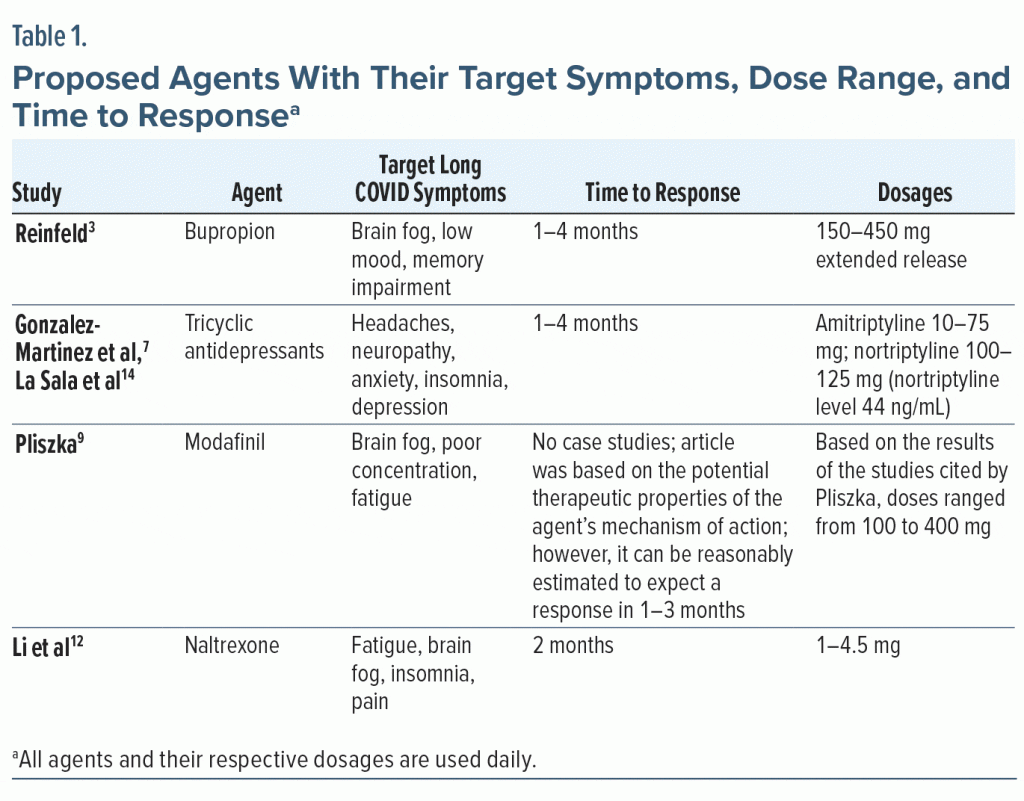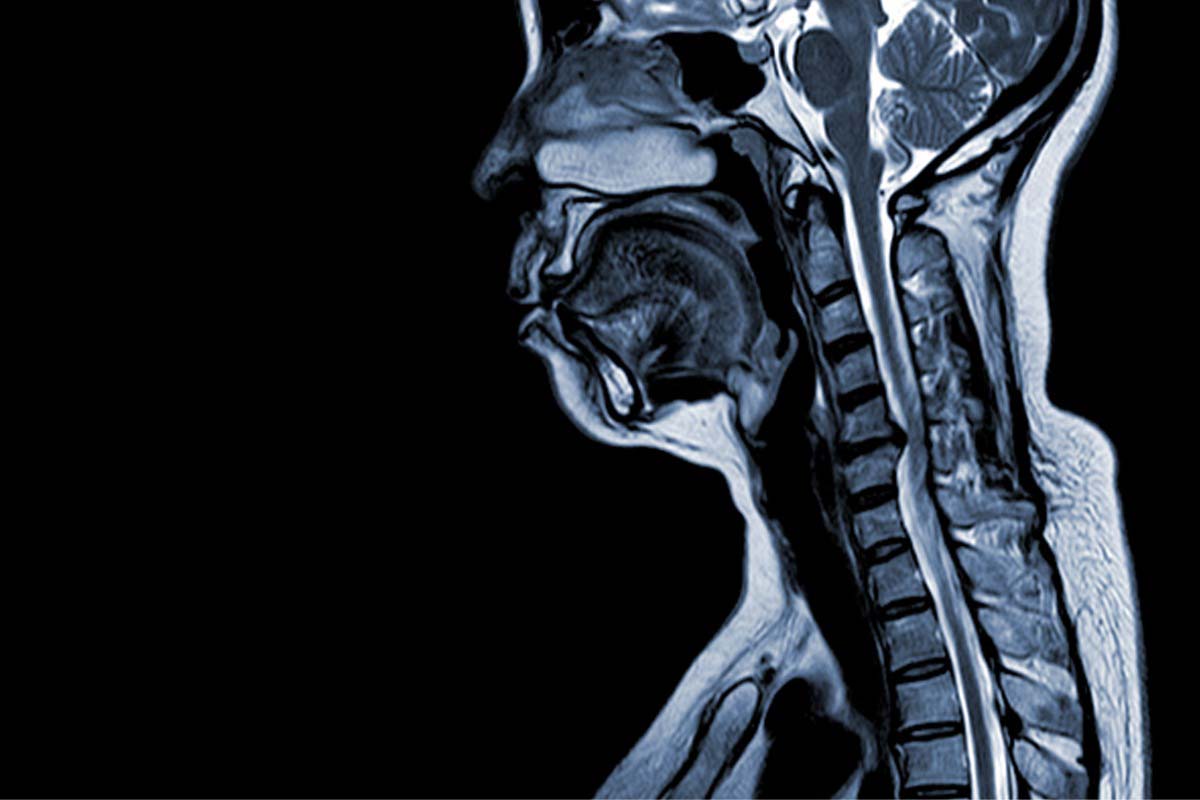COVID-19 continues to infect millions of people, and the number of those afflicted with post–COVID-19 syndrome, also known as long COVID or chronic COVID-19 syndrome, continues to rise. This complex syndrome affects multiple organ systems and is characterized by persistent neuropsychiatric symptoms. While the pathophysiology of long COVID is still being investigated, it is known to have neurologic and psychological sequelae, including brain fog, depression, anxiety, and trauma reactions.1,2
Despite the significant toll long COVID takes on individuals, there is limited literature on potential therapeutic agents for this condition. In this report, we discuss several possible therapeutic psychopharmacologic agents and explore how they may be beneficial in the treatment of long COVID.
Bupropion
Bupropion may be a suitable option for patients suffering from pronounced symptoms of long COVID, such as difficulty concentrating, low mood, and memory impairment.3 Its efficacy in treating anergic depression and attention-deficit/hyperactivity disorder makes it a natural choice. The mechanisms of increased dopaminergic and noradrenergic uptake may improve low energy, mood, and cognitive issues that can result from long COVID. Some studies4 suggest that bupropion may also attenuate cytokine production, which has been linked to neuropsychiatric sequelae. Additionally, a case series has been published describing 2 patients who experienced dramatic improvement in their COVID-induced brain fog with bupropion in doses ranging from 150 to 450 mg.5 However, it is important to note that bupropion may exacerbate anxiety or headache in certain individuals.
Tricyclic Antidepressants
It has been argued that recommending tricyclic antidepressants (TCAs) for long COVID is inappropriate due to their anticholinergic effects, which can worsen the cognition of already compromised COVID patients, and their high-risk cardiac effects in patients with fragile cardiopulmonary status.6 While these concerns are valid, it is worth noting that a case report has described the resolution of symptoms after TCA treatment, and a full cardiac workup in that particular case was negative.6 Further research is needed to determine the safety and efficacy of TCAs in the context of long COVID. TCAs have been shown to be effective in treating a variety of illnesses, including those with neurologic symptoms similar to long COVID. The dysregulation of inflammatory responses in the central and peripheral nervous systems is believed to contribute to these symptoms, and TCAs have been shown to mitigate certain proinflammatory cytokines.7 Moreover, TCAs, such as clomipramine, have good penetration through the blood-brain barrier, making them readily available in the central and peripheral nervous systems.7 A multicenter observational study8 has already demonstrated the effectiveness of TCAs in treating long COVID headaches. Thus, TCAs have the potential to be a candidate for pharmacologic treatment of the neuropsychiatric sequelae of long COVID.
Modafinil
Chronic fatigue and post-exertional malaise are major sequelae of long COVID. These symptoms overlap significantly with myalgic encephalomyelitis/chronic fatigue syndrome. Although there are no reported cases in the literature demonstrating the effectiveness of modafinil in treating long COVID, its mechanism of action suggests that it may be beneficial for future studies.9 Modafinil, a dopamine reuptake inhibitor, is US Food and Drug Administration–approved for reducing drowsiness in patients with sleep disorders and has been used off label to improve concentration and reduce fatigue in various disorders.10 Its ability to reduce fatigue and improve concentration makes it a potential candidate for targeting long COVID brain fog. Additionally, modafinil has demonstrated anti-inflammatory effects in animal models, which may help mitigate the neuropathology associated with hyperinflammatory states.11
Naltrexone
Naltrexone, an opioid receptor antagonist primarily used for the treatment of opioid and alcohol dependence, has shown potential as a therapeutic agent for long COVID.12 Although controlled studies are lacking, there is emerging evidence suggesting its effectiveness in managing certain symptoms associated with long COVID.13 At low doses of approximately 1–4.5 mg, naltrexone exhibits immunomodulatory properties and has been found to be effective in various autoinflammatory diseases.12 A recent study13 analyzed 36 subjects with a range of long COVID symptoms, including fatigue, brain fog, headache, low mood, and anxiety. The results showed significant improvements in energy levels, pain, concentration, and sleep after 2 months of low-dose naltrexone treatment.13 Importantly, the majority of participants reported no adverse effects, indicating good tolerability of low-dose naltrexone.
While larger-scale studies with control groups and longer durations are needed to confirm the efficacy of naltrexone for the general population, these findings suggest that it may hold promise as a therapeutic option for long COVID.
CONCLUSION
In conclusion, long COVID is a complex syndrome that affects multiple organ systems, including the neurologic and psychological domains. Neuropsychiatric symptoms such as brain fog, depression, anxiety, and trauma reactions have been observed in individuals with long COVID, although further research is still required to fully understand its pathophysiology.
While the literature on therapeutic agents for long COVID is limited, several psychopharmacologic options have shown potential in managing its neuropsychiatric sequelae (Table 1). Bupropion, tricyclic antidepressants, modafinil, naltrexone, and selective serotonin reuptake inhibitors are among the agents that have been proposed based on their mechanisms of action and preliminary evidence.14
It is important to note that the use of these medications should be tailored to each individual, considering factors such as the severity of symptoms, potential drug interactions, and overall health status. Furthermore, nonpharmacologic interventions, such as cognitive-behavioral therapy and lifestyle modifications, should also be considered as part of a comprehensive approach to managing the neuropsychiatric symptoms of long COVID.
Article Information
Published Online: October 3, 2023. https://doi.org/10.4088/PCC.23br03592
© 2023 Physicians Postgraduate Press, Inc.
Prim Care Companion CNS Disord. 2023;25(5):23br03592
Submitted: June 29, 2023; accepted July 20, 2023.
To Cite: Reinfeld S, La Sala M. Exploring therapeutic approaches for long COVID neuropsychiatric sequelae: current understanding and potential strategies. Prim Care Companion CNS Disord. 2023;25(5):23br03592.
Author Affiliations: PsychiaTreat (https://psychiatreat.com/) (Reinfeld); Department of Psychiatry and Behavioral Health, Stony Brook University Hospital, New York (both authors).
Corresponding Author: Samuel Reinfeld, DO, Stony Brook University Renaissance School of Medicine, 101 Nicolls Rd, Stony Brook, NY 11794 ([email protected]).
Relevant Financial Relationships: None.
Funding/Support: None.
References (14)

- Wilkes S. Bupropion. Drugs Today (Barc). 2006;42(10):671–681. PubMed CrossRef
- Mazza MG, Palladini M, De Lorenzo R, et al; COVID-19 BioB Outpatient Clinic Study group. Persistent psychopathology and neurocognitive impairment in COVID-19 survivors: Effect of inflammatory biomarkers at three-month follow-up. Brain Behav Immun. 2021;94:138–147. PubMed CrossRef
- Reinfeld S. Can bupropion treat COVID-19-induced brain fog? a case series. Int Clin Psychopharmacol. 2023;38(3):189–191. PubMed CrossRef
- Castanares-Zapatero D, Chalon P, Kohn L, et al. Pathophysiology and mechanism of long COVID: a comprehensive review. Ann Med. 2022;54(1):1473–1487. PubMed CrossRef
- Xia Z, DePierre JW, Nässberger L. Tricyclic antidepressants inhibit IL-6, IL-1 beta and TNF-alpha release in human blood monocytes and IL-2 and interferon-gamma in T cells. Immunopharmacology. 1996;34(1):27–37. PubMed CrossRef
- Nobile B, Durand M, Olié E, et al. The anti-inflammatory effect of the tricyclic antidepressant clomipramine and its high penetration in the brain might be useful to prevent the psychiatric consequences of SARS-CoV-2 infection. Front Pharmacol. 2021;12:615695. PubMed CrossRef
- Gonzalez-Martinez A, Guerrero-Peral ÁL, Arias-Rivas S, et al. Amitriptyline for post-COVID headache: effectiveness, tolerability, and response predictors. J Neurol. 2022;269(11):5702–5709. PubMed CrossRef
- Wong TL, Weitzer DJ. Long COVID and Myalgic encephalomyelitis/chronic fatigue syndrome (ME/CFS): a systemic review and comparison of clinical presentation and symptomatology. Medicina (Kaunas). 2021;57(5):418. PubMed CrossRef
- Pliszka AG. Modafinil: a review and its potential use in the treatment of long COVID fatigue and neurocognitive deficits. Am J Psychiatry Resid J. 2022;17(4):5–7. CrossRef
- Rabkin JG, McElhiney MC, Rabkin R, et al. Modafinil treatment for fatigue in HIV/AIDS: a randomized placebo-controlled study. J Clin Psychiatry. 2010;71(6):707–715. PubMed CrossRef
- Zager A. Modulating the immune response with the wake-promoting drug modafinil: a potential therapeutic approach for inflammatory disorders. Brain Behav Immun. 2020;88:878–886. PubMed CrossRef
- Li Z, You Y, Griffin N, et al. Low-dose naltrexone (LDN): a promising treatment in immune-related diseases and cancer therapy. Int Immunopharmacol. 2018;61:178–184. PubMed CrossRef
- O’Kelly B, Vidal L, McHugh T, et al. Safety and efficacy of low dose naltrexone in a long covid cohort; an interventional pre-post study. Brain Behav Immun Health. 2022;24:100485. PubMed CrossRef
- La Sala MS, Reinfeld S, Constantino E. Treatment of long-COVID neuropsychiatric sequelae using tricyclic antidepressants: a case series. J Clin Psychopharmacol. 2023;43(5):458–460. PubMed CrossRef
Enjoy this premium PDF as part of your membership benefits!






